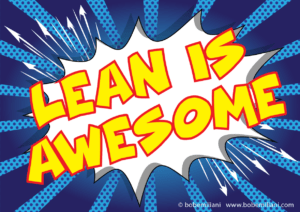
The concepts, ideas, values, methods, and assumptions of Lean management combine to create an understanding of ourselves and our profession (progressive management) which leads to a conclusion that there is inherent goodness in Lean management — so much so, that for many people Lean is beyond critique. Lean is awesome. Period.
As a result, people may become subject to exploitation and self-sacrifice given the importance they place on Lean management. Exploitation can be in the form jobs where the promise of vast improvement is greater than the bounded reality drawn by managers. Self-sacrifice can be in the form of promoting Lean in one’s organization to the point of running afoul of one’s boss or top company leaders. The awesomeness of Lean silently asks us to sacrifice ourselves because our work matters. We have no choice but to press forward valuing workers and respecting people, even if company leaders so not agree.
The awesomeness of Lean causes us to think of it as something special — a special object, a special system, or a special institution. Lean is amazing; it infuses us with its deep importance and that we are doing something meaningful. We begin to believe that Lean matters more than anything else. This belief will expose people to the risk of making unwise personal decisions and decisions that could be bad for Lean as well.
We easily understand the notion that “machines serve people” and that the reverse, that “people serve machines,” is unacceptable. What is Lean’s role? Should Lean serve people, or should people serve Lean? Do we confuse the two such that promoting Lean leads to sacrificing one’s self? To be sure, we care about Lean management and are motivated by good intentions. But Lean can never be more important than the people who practice it.
A younger generation is now coming to Lean with great energy and vitality. That’s good, but I hope that they do not make the same mistakes as others before them, particularly with respect to efforts to advance Lean in companies where it is not truly wanted by top company leaders. Lean can bring harm to you if you are not careful. If you have experienced harm, then you have fallen into the trap of believing that Lean is more important that your well-being. It is not.
The younger generation is deeply interested in Lean management. They will select one or a few people to help them learn the subject, variously described as coach, mentor, teacher, or advisor, who can be live persons with whom one has personal contact or virtual persons, such as writers, whose books you study. The choice you make can have a profound impact on what you learn, how fast you learn, and how well you learn, and whether you fall into the trap of believing that Lean is more important that your well-being.
In broad terms, the younger generation has two choices for coach, mentor, teacher, or advisor: cheerleader or expert. A cheerleader is someone who is enthusiastic and boundlessly positive, but who usually has less experience and is less inclined to give the kind of critical feedback that more rapidly advances one’s learning. Most people choose a cheerleader because positive feedback is preferred over critical feedback. The older generation of Lean practitioners mostly chose Lean cheerleaders. An expert is someone with greater experience who gives critical, and perhaps sometimes even harsh feedback. They provide important information that the friendly cheerleaders will not supply, thereby limiting your learning and growth.
If the younger generation chooses cheerleaders, they, like the older generation, will always be behind the times because cheerleaders lack the experience and knowledge that experts possess. Cheerleaders are late to recognize new and better relevant information and are inclined to avoid conflict. Choosing a cheerleader might seem like a good choice — they convey high energy and enthusiasm — but in doing so you disrespect yourself. You implicitly devalue your intelligence and therefore your capability to think, learn, and grow at a higher rate.
In Lean-world, cheerleaders and experts give different types of advice which causes a great deal of confusion. For example, the cheerleaders say do A3 reports, the experts say do kaizen (“master the basics”). The cheerleaders say do kanban, the experts say create flow. The younger generation of Lean practitioners has the task of figuring out who is a cheerleader and who is an expert. If someone never says anything critical about Lean, your understanding of it, or your practice of it, then it is likely they are a cheerleader. If someone uses their intelligence and thinks critically about Lean, your understanding of it, and your practice of it, then they are probably an expert who you can learn much from.
